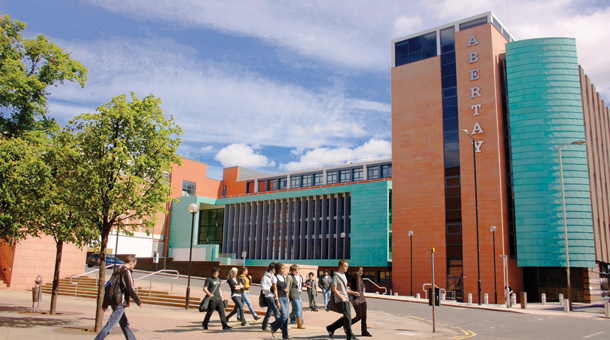Get Into Games 2015: Abertay University

Abertay University’s annual Dare To Be Digital competition might get most of the column inches, but the university’s innovative approach to learning doesn’t end there. ProfessorGregor White, who teaches innovation and professional development at a postgraduate level in the university’s School Of Arts, Media And Computer Games, explains how the spirit of its famous game competition permeates everything the school does.
Abertay has a wide range of courses. What’s on offer?
For undergraduates, there’s our BA (Hons) in Computer Arts, BSc (Hons) in Computer Game Applications Development, BSc (Hons) in Computer Games Technology, BA (Hons) in Creative Sound Production, and a BA (Hons) in Games Design And Production Management. At postgraduate level, we have an MSc in Computer Games Technology, and a Professional Masters in Games Development.
With so many avenues into game creation, why is a degree important?
The demand for a university education is something we’ve seen continue to increase since we launched the world’s first Computer Games Technology degree in 1997. Modern game development can involve complex project management as well as exceptionally high levels of creativity, so graduates who have experience of creating multiple game projects while studying at Abertay have a real advantage. They can apply themselves to whatever career they choose, from starting their own indie studio to joining a major triple-A team.
What makes Abertay stand out among all the other choices?
A critical part of our approach is that students make games throughout their degree and work within teams that cover all the different skills – art, audio, code, design and production – real game studios need. We’ve always had direct industry input into our degrees, and we develop all our courses in partnership with the game companies on our industry advisory board. Plus, the only route into Creative Skillet’s game internships is through an accredited course; Abertay has the most Creative Skillset-accredited courses in the UK.
What opportunities does Dare To Be Digital offer students?
Dare is another way that Abertay simulates what it’s like to work at a game company, as well as being an incredibly enjoyable and challenging experience. All 15 teams get support from mentors including Denki, Ninja Kiwi, Ubisoft Reflections, Sega and Tag Games. This year, it’s taking place from Thursday 13 to Sunday 16 August and we’re expecting over 13,000 visitors. Plus, for the first time we’re running it as a globally distributed competition, so you can build your game from your own home or university anywhere in the world before coming to Dundee to show it off to thousands of people!
You also have a PlayStation teaching lab. How was that set up?
We were delighted to open Europe’s largest PlayStation teaching lab last year, giving students access to Vita and PS4 devkits as well as the PS3 devkits we already owned. PlayStation First has been a great partner and we work closely with them to let students access the same technology as Sony’s studios.
How closely does students’ experience match the reality of working in games?
I’m really proud of how closely we’ve built our teaching areas to look and work like a real development studio. About 15 years ago, we ripped out all the walls on the ground floor to create an open-plan studio space for our teaching staff and students, just like a real game company.
Weekly digests, tales from the communities you love, and more
Edge magazine was launched in 1993 with a mission to dig deep into the inner workings of the international videogame industry, quickly building a reputation for next-level analysis, features, interviews and reviews that holds fast nearly 30 years on.



